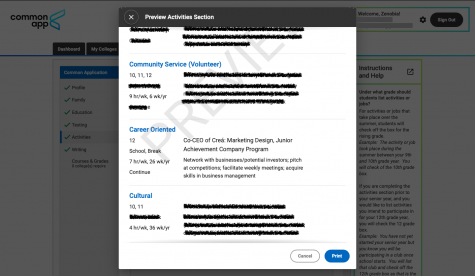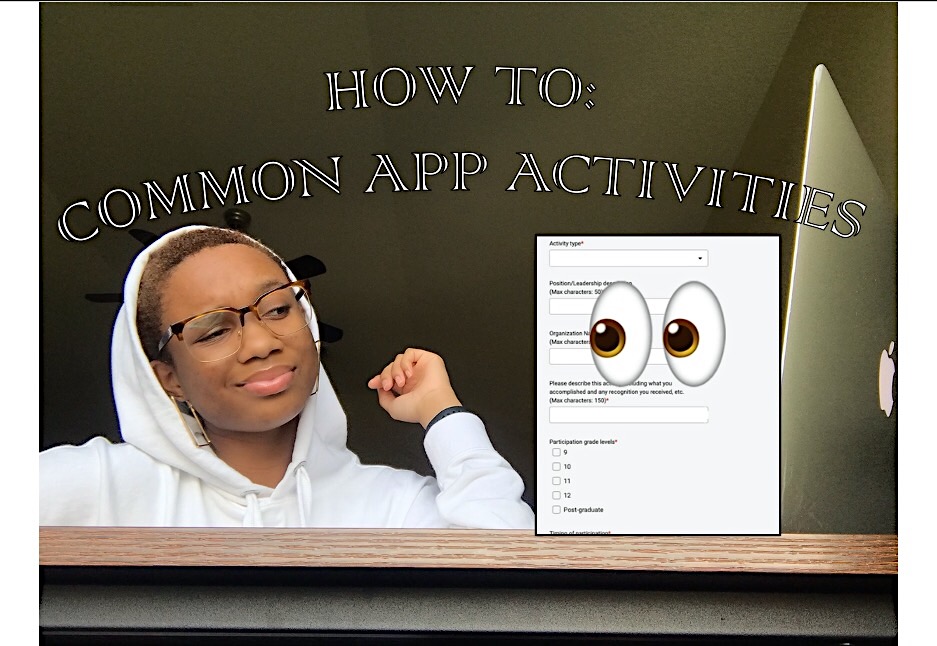How to Arrange Your Activities in Common App
Oftentimes students don't recognize the importance of strategizing this section of the Common App application. I'm here to help you out though!
October 20, 2020
The Common App Activities section, arguably the most insignificant, straightforward part of this entire process, right?
WRONG. Sorry to be the one to break the news.
The activities section is just as important as anything else in this application, so knowing how to work the system is important. There is a certain way students should go about ordering and detailing their extracurriculars to make the most of this space’s purpose.
As always, I’m here for all your college application needs! I’ve got you, we’ve got this.
Choosing an Order
Before you do anything else, you have to actually enter the activities. How do we do this?
There are a few different aspects to be aware of when entering your list, so I’ll give you all of them and you can incorporate them into your list however you like.
Don’t Just Input Activities, Order from “Most Important” to “Least Important”
While I wholeheartedly believe you should put in all the extracurriculars you can, until you either run out of activities or space, I won’t lie to you and say Admissions will always look at all of these. You’ll need to analyze what you have, and order it based on importance to you.
I say “importance to you” not just because this is another chance for readers to get to know you better. If something is important to you, you’re going to spend time on it, and stay involved in it. These are the type of activities that will paint you in the best light to Admissions.
Admissions officers look at the years you’ve spent, the time put in a week, and the weeks spent per year. So be wary of putting things at the top that you aren’t consistent with, but also be wary of overcompensating.
These people have read enough applications to know when something doesn’t seem right. If you spend ten hours a week on six different activities, all at the same time… that’s 60 hours a week. How do you make time for that, as well as school?
Be careful.
Family/Work Responsibilities (if eligible)
I wanted to include this beforehand, so no one gets discouraged if they don’t have the activities below! Admissions officers completely understand if you have siblings to take care of, or if you need to work to support yourself or your family.
Quite frankly, I’d personally equate the responsibilities you learn from these experiences to that of a club president anyways. If you qualify for this, you definitely want to add it in your activities, at the top.
If you take care of your siblings, make sure you include ALL responsibilities, even things like cooking dinner and ensuring they take their showers.
If you work, a great way to elevate the effectiveness of your activity is to not only include what you do, but the skills you acquired through doing it. I’ll talk about this later in the article.
Following Basic Principles (if eligible)
Out of the ten activities (max) you can enter into your Common App, oftentimes admissions officers won’t look at all of them. Because of this, we have to make sure whatever they do see is worthwhile.
Most schools have three basic principles: Academics/Career, Leadership, and Service. So, it only makes sense to show that you embody these at the top.
If you were in any leadership positions, for any category of extracurriculars, you should put them first. If you did some huge missionary trip with your church, that should be in the up there too. If you were in Mathletes all four years and worked your way up to Captain, or went to State/Nationals for DECA, definitely make sure officers see it.
If you can, it would do you good to include one of each these three principles for your top three extracurriculars.
However, not everyone has all three. Some only qualify for one of these, or maybe two, and that’s okay! You’ll still be fine, just make sure the officers see what you have done.
What Counts as Academics/Career?
I put both of these as one because we all have different strengths. Not every person is super adept at academic-related extracurriculars, so they won’t just go be a Mathlete for no reason.
Many people prefer to use their talents in CTSOs, or Career & Technical Student Organizations. This includes DECA, FCCLA, HOSA, and several more.
On the flip side, some people are amazing at Math, Science, Social Studies, even Latin, and choose to show that talent to the world. Either way, it’s fantastic and I’m proud of you!
Include either/both, please.
What Counts as Leadership?
This one’s pretty obvious, but I’m going to elaborate anyways.
Board member of a club/organization, community-service acts that you played a large role in organizing, a student advisory board for an organization… you get me?
What Counts as Service?
Service is actually much more than volunteering with Lunches of Love, or going on missionary trips. Service is going to tutor students at your local elementary/middle school/jr high. It’s putting on an educational program for Hispanic Heritage Month, or Black History Month, etc.. It’s being involved in planning for the annual Winter Wonderland your school puts on for elementary school kids.
The only thing I’ll say is, if it’s a random act it won’t be worth as much as something you’re committed to. If you tutor every single week, that’s great. If you do this educational program every year, that’s fantastic. If you volunteer every year to help put together Winter Wonderland, let them know.
Wording Your Activities
You only get a certain amount of characters for each section, so how do we make the most of this?
For reference as I move along, I’ve included my third activity here (you can click on it to go full-screen). This is how it will look when the Admissions officers view it. I also wanted y’all to see my second and fourth, just to understand what I considered a priority.
My Community Service activity is not only closer to my heart, but is something I’ve been doing for years, so it went before this. My Cultural activity is something that I participated in for more years than this activity, but is not as huge of an accomplishment and required less attention.
 – My activity type is Career Oriented
– My activity type is Career Oriented
– My position is Co-CEO; included the company
– The organization I’m in is Junior Achievement
– I gave a description of my job
– I filled out the participation grade levels and timing (school year & break)
– Time spent per week
– Weeks spent per year
Position/Leadership description & Org. Name
Less is always more, be concise; you only have 100 characters, but you truly don’t need to use all of them unless an organization just happens to have a long name.
Special case: Career Oriented, Company vs. Company Program. If you own an independent business (not under a company program), put your position and company in the same box, and leave the organization name alone. It is not a required section.
Describe this activity
150 characters may seem like a lot when I say it right here, but as someone who’s already filled out the activities section, let me tell you,
it’s not. Like, at all.
So don’t feel pressured to type in complete complex sentences. It is perfectly fine to use incomplete sentences in this circumstance, separating matter-of-fact statements with commas/semicolons.
In one tiny box, you’re trying to fit in as many aspects of your position as possible, how you contribute, and any accomplishments you may have made during the time. Just make it work, you know?
My three favorite tips that I’ve gotten come from an article on CollegeVine that goes into detail about this process.
Use Action-Oriented Verbs
A lot of students who held leadership positions will start their description with something like “responsible for,” (I did this at first), but this doesn’t do anything. It’s obvious you were in charge of something, that’s probably why the activity is here.
Using action-oriented verbs gives your description an active tone, and implies responsibility while being specific about what you actually did. This includes words like “managed,” “facilitated,” “networked,” etc.
Quantify Your Accomplishments
Numbers talk, sometimes better than words do. They’re easy to understand and take out the guesswork of your level of responsibility, which makes your role more credible. If you were in charge of marketing for a fundraising event, give a number to how many people you networked with, and the event’s turnout.
CollegeVine gives a great example of this.
Talk About the Skills Learned
This is really effective to use when you don’t have as many school/non-school activities because you have family obligations or a job. Like I said earlier, the skills you acquire from this type of responsibility can really be equated to that of a club President, or even more.
Instead of naming out specific tasks that you did, you can generalize the tasks and detail what you learned from them.
CollegeVine provides an example of this as well:
Be Specific
I’m pretty sure for almost any activity you include, an admissions officer has either seen it before or seen something like it. You don’t need to waste characters describing the general functions of a club.
Tell the readers about your specific role, showcase your dedication through specific achievements.
Once again, here’s an example from CollegeVine:
Hours Spent Per Week/Weeks Per Year
All I can say is be honest.
But also, milk the time you spent for all it’s worth.
The best advice I ever got on how to calculate hours was from my freshman World Geography teacher, when I was adding hours in for my service cord. I’d worked with her and some other students to organize a candlelight vigil for George Floyd, and was asking her how much time I should claim.
She said, “You need to include everything. Not just the time you spent in meetings, but the time you spent prepping for those meetings. Every email, every phone call, all individual planning. Make sure you calculate every single minute you spent working on this.”
I highly recommend you do the same, while being as honest with yourself as possible. Don’t undervalue yourself, but also don’t grossly exaggerate.
Hope You Feel Better!
Once again, our conversation is coming to a close. As always, you’ll be missed.
I hope the tips I’ve put in here help boost your confidence in Common App Activity Section, as well as the overall application.
I’d like to remind you that you’re absolutely incredible, and I’m so proud of you for how far you’ve come in your application, and for reaching out to other resources to make sure you’re on point. Acceptance letters all 2020-21!!
I have complete faith in you.
Love,
Zenobia



